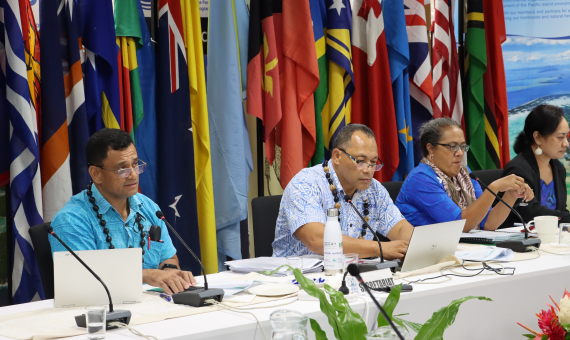News - Sep 9, 2021 Strengthening the Management of Hazardous Waste in the Region

8 September 2021, Apia, SAMOA: Opportunities to strengthen awareness and management of mercury, asbestos, and healthcare waste in the Pacific, was highlighted to Members attending the 30th SPREP Meeting of Officials, with the theme of “Accelerating actions for a resilient Blue Pacific”.
Pacific island countries and territories have limited capacity to appropriately receive, use, store and transport hazardous materials imported into their countries.
“Limited access to regional hazardous waste management facilities means that in most cases, the end-of-life hazardous materials are released to the environment, which poses imminent and ongoing risks to both human and environmental health”, stated Mr Anthony Talouli, Actg. Director for SPREPs Waste Management and Pollution Control (WMPC) programme.
Mr Talouli added that countries have existing mechanisms suitable to manage hazardous wastes such as Multilateral Environmental Agreements and Regional Agreements to ban importation regionally, supported through national legislation, capacity building, awareness, and education activities.
Additionally, countries implement legislative mechanisms that restrict, control and manage the safe use, handling, storage, disposal of these products to reduce or eliminate the social and environmental risks posed by these products.
“The management of hazardous wastes that pose a significant risk to human and environmental health have been discussed in past SPREP Meetings, including discussions on bans on the importation and use, which are currently the focus of donor-funded projects implemented by SPREP”, commented Mr Talouli.
The European Union-funded PacWastePlus programme has continued the initial asbestos management work conducted by the PacWaste project and is implementing a number of activities that will actively remove asbestos materials in several countries and provide strong legislative and management tools to all countries to assist with the active and ongoing management of asbestos.
Specific actions include asbestos abatement work in Kiribati, Nauru, Niue, and Tonga, to safely package, transport and dispose of asbestos stockpiles and several government-managed sites.
The PacWastePlus programme will also assist the assessment of buildings in outer islands of Tuvalu to determine if they have asbestos containing materials present, and developing and delivering appropriate training for customs officials, safe handling, abatement of asbestos.
Additional support will be provided to countries seeking to implement legislative instruments banning the import, and establishing standards for the use, transportation, and disposal of asbestos-containing materials.
PacWastePlus has developed an Asbestos Management Legislative Reform Pathway that clearly identifies the steps necessary to institute bans on asbestos. This Pathway utilises and summaries the various work is undertaken such as an analysis of legislative options for the management of asbestos, development of a guidance note/brief on the issues, and a Policy Note to guide the drafting of National legislation to impose a ban on the importation of asbestos.
The development of these resources is in direct response to the outcomes of previous SPREP Meetings requesting specific assistance to manage asbestos and ban its importation to the region.

